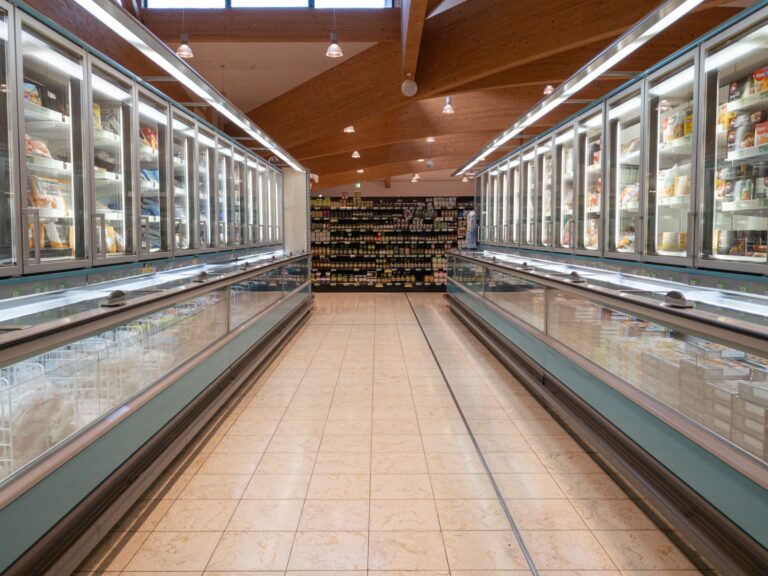To make this measure more effective and tailored to the specific context of your company, we recommend that you first perform an overall analysis of your energy situation.
Replacement of linear or vertical chillers and freezers
The project aims to replace old chillers and freezers with new generation refrigeration units that are closed, well insulated, fitted with more efficient fans and LED lighting. Defrosting is optimised and it is possible to increase the temperature regime of the evaporator circuit.
This system applies to supermarkets or grocery stores with chillers and freezers to store food in store. By installing this technology, which has been available on the market for more than 5 years, the company can save on its electricity bills and reduce its carbon footprint. However, implementing this measure can be complex and requires the temporary shutdown of production during the technical installation stage.
Energy and environmental impact
Replacing the chillers and freezers leads to direct savings in terms of electrical usage, not regarding the units themselves, but also on the associated refrigeration process. Thanks to better insulation and more efficient defrosting, cold losses are reduced, which reduces the power consumption of refrigeration.
Savings on electricity bills are estimated at 80% for freezers and 25% for refrigeration.
State subsidy application
State subsidies
Please note: any application for government or non-government subsidies must comply with the “incentive effect”, subject to compliance with the subsidy conditions.
To ensure that the ‘incentive effect’ is respected, no binding commitment (signing a quotation; paying an advance) may be made BEFORE submitting the application file or receiving the agreement in principle from the State or the electricity and natural gas supplier following an application for subsidies.
Temporary environmental impact aid
Extended “SME Packages Sustainability” aid scheme, to give companies greater incentives to invest in measures that significantly improve their environmental impact. Investments under this climate protection measure amount to 70% for small enterprises, 60% for medium-sized enterprises and 50% for large enterprises, for projects costing more than €7,500, with a maximum subsidy of €100,000.
- Verification of company eligibility and costs: Ministry of the Economy (Department for Support to SMEs)
- Application deadline: 30 June 2025
- For any questions:
- Chambre des Métiers for the trades (Chamber of Skilled Trades and Crafts)
- Chamber of Commerce for companies in the non-craft sectors
- Financial Aid for small and medium-sized enterprises covering up to 70% of eligible costs for the implementation of a project aimed at reducing the environmental impact. The eligible project budget must be in a range from 3.000 € to 25.000 € excl. VAT.
- For more information:
- Chambre des Métiers for craft companies
- Chamber of Commerce for businesses in the non-craft sectors
Environmental protection scheme – Investment aid for the protection of the environment
- Verification of company eligibility and costs: General Directorate for Industry, new Technology and Research
- Support in drawing up the subsidy application file prior to submission to the Ministry of the Economy
- For any questions: Luxinnovation
- More information and recommendations for companies on investing in the environment are available in the Guide simplifié pour les entreprises (Simplified Guide for Businesses)
- Support in drawing up the subsidy application file prior to submission to the Ministry of the Economy
N.B. State subsidies cannot be combined for the same project
Subsidies from electricity and natural gas suppliers
Since 2015, natural gas and electricity suppliers are required to make energy savings for consumers under the obligation scheme. Since then, energy suppliers have been offering support and advice, as well as subsidy programmes for consumers to implement energy efficiency measures.
The following suppliers offer this service for companies:
N.B. Supplier subsidies can be combined with any state subsidies for the same project.
